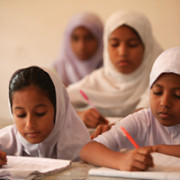
About Venkatachalam Anbumozhi
Venkatachalam Anbumozhi is a senior energy economist at the Economic Research Institute for ASEAN and East Asia (ERIA).Realizing the Paris Agreement: How can Asia manage the transition to a low-carbon economy?

As the world celebrates the Paris agreement, after 20 years of fraught meetings, its significance for the future development pathways of the emerging economies of Asia cannot be underestimated. Critically, it will increase the flow of additional public and private finance for vulnerable countries for both low carbon and climate resilient investments. Low-carbon green growth pathways toward a possible 1.5°C limit and 5-year reviews will be played out through the Intended Nationally Determined Contributions (INDCs).
Securing energy for low-carbon Asia: What needs fixing?

The pattern of energy supply and demand that has prevailed over the last 3 decades is undergoing transformation, with great consequences for Asia’s energy security and regional cooperation. The two factors driving this transformation are the rise of the Association of Southeast Asian Nations (ASEAN), the People’s Republic of China (PRC), and India as major energy consumers, and the impressive additions to oil, gas, and coal output. The first is driven by growing populations, industrial growth, and economic ascendance of emerging economies. The second stems from the opening up of new geological formations for the production of conventional fuels at reasonable costs.
How to accelerate the implementation of the Millennium Development Goals

On 5 April 2013, the world’s largest and most successful anti-poverty campaign reached the 1,000-day mark toward achieving the Millennium Development Goals (MDGs) by 2015. The MDGs were established in 2000, when leaders gathered at the United Nations to pledge to cut global poverty and hunger by half, fight disease, reduce child mortality rates, and expand education and economic opportunities for girls and women. This was not the first time world leaders had made lofty promises to reduce poverty, and cynics expected the MDGs to be abandoned as too ambitious. Instead, MDGs have helped set national and global priorities, mobilize action, and achieve remarkable results in poverty reduction.


Search
Subscribe / Connect to Asia Pathways
Subjects
- Agriculture and natural resources
- Blog
- Capacity development
- Climate change
- Economics
- Education
- Energy
- Environment
- Finance sector development
- Gender
- Governance and public sector management
- Health
- Industry and trade
- Information and Communications Technology
- Infrastructure
- Miscellaneous
- Population
- Poverty
- Private sector development
- Regional cooperation and integration
- Sanitation
- Social development and protection
- Transport
- Uncategorized
- Urban development
- Video Blog
- Water
Recent Posts
- Unraveling the Health Risks of Climate Change
- Linking Farmers to Markets Through Agricultural Cooperatives and E-Commerce in Asia
- How Can Governments Support Electricity Distribution to Achieve Net Zero in Asia?
- Promoting Corporate Climate Action Through Greenhouse Gas Accounting
- Evaluating G7 Commitments on Climate Change, Health, Well-Being, and Agriculture




Recent Comments